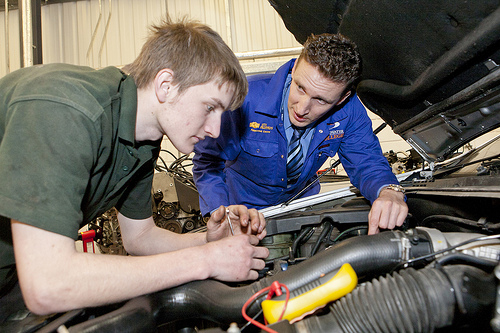
Is it time for you to formalize a proper apprenticeship program to nurture your next A-tech? Theres a better chance he’ll “cross the finish line” if you do!
By Allan Janssen
I’ve written before about the remarkable and inspiring skilled trades competitions that are held to showcase the talents of thousands of Canadian apprentices each year.
What I like about them is that they’re equal parts competition and celebration, and that they serve as a powerful demonstration to visiting school children that working with one’s hands does not mean mindless, dirty work.
The middle school and high school students that traipse through the competition halls, giggling and pushing each other, excitedly snapping up the giveaways at sponsor booths, clearly see the event as a welcome day away from classes. But I’m sure they’re also getting the message that skilled trades constitute fundamental, essential work that is challenging, creative, and potentially lucrative.
It’s not hard to appreciate the sense of accomplishment the young competitors feel as they practice their skills.
Indeed, at last year’s national competition, many of the apprentices wore bow ties as a symbol of the pride they take in their work, adopting a sort of uniform that demands the same kind of respect as a surgeon’s greens, an accountant’s sweater vest, or a lawyer’s three-piece suit.
As I said, these events are a cause for celebration… so what is not discussed is the unfortunate drop-out rate among apprentices. Recent studies show that across the board we lose about one in three apprentices after the first year.
Obviously this is a cause of concern for professions like automotive service which needs as many new workers as it can get as quickly, as they can get them.
Finding a way to stem this attrition rate was the main focus of a recent meeting of the Canadian Apprenticeship Forum. Executive director Sarah Watts-Rynard shared the results of a “Crossing the Finish Line” survey of 753 apprentices who shared potential reasons why so many are leaving before they earn their tickets.
Despite the allure of good pay (cited by 53% of respondents), the promise of interesting work (53%), and job satisfaction (48%), apprentices were disappointed by a failure to understand the full spectrum of job opportunities and the lack of a clear career path. They also said they needed mentors to bounce their questions and concerns off of.
It turns out providing mentors to these career hopefuls has a profound effect on apprenticeship completion. Having a journeyperson who is invested in their development, and who is willing to teach them is one of the greatest influences to stay in the profession. It amounts to a support system for apprentices.
Shops that take this issue seriously enough to establish an in-house program to shepherd apprentices so they earn their ticket in a timely manner will be clear winners in the competition for new skilled workers.
This means not being satisfied with slow or no progress. Perpetual apprenticeships do not benefit the industry, the shop, or the individual.
According to the Canadian Apprenticeship Forum, apprentices who have not finished the program in six years are unlikely to ever “cross the finish line.”
As far as I can tell, this represents a huge lost opportunity to increase our ranks and strengthen the trade.
This editorial appears in the April 2016 issue of CARS magazine. Tell me what you think. You can reach me at allan@newcom.ca
Related Posts
Comments
-
Allan .
I just waived goodbye to another apprentice . I have 3 good ones right now that are eager and willing but …. the fallen ones before are many .
This last one that we just parted ways with has a rap sheet with me 2 pages long and we could not let him touch a retail clients car for 4 of the 6 months he was here . I personally described how to do a rear wheel bearing on a 2005 Ford Escape and so did my technicians but he did it his way and ruined a perfectly good reluctor ring on the rear drive shaft ( adding a redo to the next techs day ) .
There are many reasons why they are leaving . One of the biggest reasons why they are leaving is because they are not arriving with a keen love for what they will be learning about . The apprentices I grew up with arrived with the background of working with their dads or neighbour or friends in the driveway on cars , they had already taken the family lawnmower apart with grandpa , fixed their own dirt bikes , read popular mechanics and hot rod magazines and had grease under their fingernails already at age 14 . The old apprentices I grew up with had 2-3 years of high school auto mechanics classes under his belt and owned a small toolbox of tools too . When these old day apprentices got told what to do they listened to learn and to add to their arsenault of techniques knowing they would need that in the future . The light bulb in their head lit up like they were getting the answer that they had been pondering and looking for the answer too already .
The beating we and the old apprentices got from our old dog mechanics that trained us made us better ( even though we didn’t like being treated like we were hopeless in their eyes sometimes ) .
I don’t think the stamina is the same in some of the new ones is the same . I don’t think the passion is their either .
I think -
I agree, Rick, that a passion for the job is certainly critical. It helps them endure the unpleasant tasks. It gives them a bigger sense of purpose. It helps them focus on the end goal. Without it the drudgery of the job will weigh more heavily on them. A lot is made about the work ethic of today’s young people. But I think you’re right… the bigger problem is that fewer people grow up with a passion for cars.
-
I dont think a passion for cars is important as a passion for success in this trade today. I am a technician of 17 years. I specialize in electrical and diagnostics. I love my job. I am extremley passionate about what i do and look forward to work every morning. I have never opened a “Hot Rod” magazine, i dont have any interest in hot rods, and i wasnt beaten up by the “old dog” techs that I came up with. They were very good mentors and motivators for me and all of the other younger guys that came up with me. We all have great work ethics. The younger guys that work with me now also have great work ethics. Todays generation of techs and young people are different. As is the repair industry. We need to adapt. Not expect the modern repair industry (new techs included) adapt to us. If techs seem uninterested, the problem may not be “young people today” but rather how they are managed and fostered. This trade is not for everyone, but the ones that have the potential, must be mentored properly in order to achieve mutual success on both the buisness end, and the apprentices end.
-













Leave a Reply